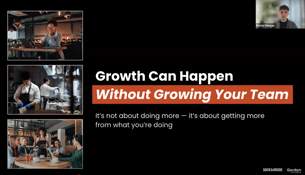When it comes to restaurant profitability, few opportunities rival private events. While a typical full-service restaurant runs on razor-thin profit margins of 2–6 percent, private events average closer to 20 percent margins — and in some cases, much higher.
Beyond the dollars, private events also act as a powerful marketing tool. One event potentially brings dozens of new people through the door, potentially turning every event into a room full of folks who will tell others about your restaurant.
As Nick Cianfaglione, co-founder of RestauRent, explains, “It’s higher margins because you’re able to actually predict your labor and food and input costs. It’s guaranteed revenue.
“But then it helps grow your business because you’re using one person to then introduce dozens, if not hundreds, of other people to your location. It’s basically like a bunch of micro-influencers.”
Why Private Events Matter
For many restaurant operators, private events are still an afterthought, something booked through a web form or handled on the fly. But ignoring private dining promotion means missing out on a predictable revenue stream that can smooth out the ups and downs of regular dining traffic.
Unlike a random slow Sunday, private events are booked weeks or months in advance, providing stability. And the private event ROI (return on investment) speaks for itself. Nick gave the following figures, based on real-time booking data on RestauRent:
- Average event revenue: ~$4,350
- Average event size: ~55 guests
- Average profit margins: ~20% (compared to 2–6% in typical full-service dining)
In high-demand markets, profit margins can climb to 60 percent, according to Tripleseat. So, the math is sound — private events aren’t just supplemental, they can be transformational.
The State of Private Event Marketing
While private events have the potential to be a major revenue driver, many restaurants and venues still struggle to market them effectively.
Nick points out that the gap between how guests search for event spaces and how venues present themselves is wider than many realize.
“Private event marketing today is still highly fragmented. Most restaurants rely on outdated tactics like a single line on their website or a ‘contact us’ form buried under the catering tab. There’s very little digital visibility, which means operators are leaving money on the table,” says Nick.
The Shift to Digital-First Search
Guest behavior has also shifted. Diners no longer rely on word-of-mouth or dialing a favorite spot directly.
“We’ve seen a major shift toward digital-first search. People used to rely heavily on word of mouth or calling their favorite spots directly. Now, the majority of guests start online, whether through Google, social media, or dedicated platforms,” explains Nick.
And importantly, most of these guests aren’t professional event planners but individuals planning birthdays, team dinners, or milestone celebrations. That means they’re far more likely to book if the process feels simple, transparent, and online-first with clear pricing, photos, and availability.
Common Pitfalls in Private Event Marketing
Despite the potential, many restaurants fall short when promoting their event spaces. A lack of professional photos, hidden calls-to-action, and unclear booking details make it hard for potential customers to take the next step.
As Nick explains, too many operators pour their energy into daily dining traffic while treating event marketing as an afterthought.
“Restaurants put a ton of energy into their day-to-day dining marketing, but events get pushed to the background. That usually shows up as outdated photos, no clear call-to-action, or forcing guests to ‘call for details.’”
Limiting Marketing to Existing Customers
Another missed opportunity is only marketing to existing customers. “Most restaurants only market their event spaces to people who are already on their website or in their dining room. That means they’re only reaching existing customers, not new ones actively searching for a space.”
This is where platforms like RestauRent step in, helping restaurants showcase their event spaces to a much larger audience actively searching for private dining promotion opportunities.
Some Simple, Low-Cost Tactics
Not every operator has a big marketing budget, but that doesn’t mean they’re out of options.
Automation
Platforms like RestauRent automatically promote a venue’s event space daily across Google, Facebook, Instagram, TikTok, Reddit, Pinterest, LinkedIn, and email, reaching a network of hundreds of thousands of local planners.

To promote private dining, you can add a QR code to your menu or a "Book Your Party" promo to your receipts. (Photo courtesy of RestauRent)
Other budget-friendly ideas:
- Adding a QR code on menus that links to an event inquiry page
- Including a “Book your party with us” callout on receipts
- Running a once-a-year email campaign to existing diners
- Updating CTAs on your website with clear details and photos
These small actions can create steady awareness without requiring major investment.
Using Guests as Event Ambassadors
Your most loyal diners are also your best marketing channel.
“One of my favorite tactics is engaging with your highest engaged customers through email or even onsite,” says Nick. “Having a CTA about how they can get an exclusive discount on something for hosting their event is key.
“They already love your location, so now it’s putting the idea in their mind that they can share their favorite location with their friends.”
By positioning events as a natural extension of loyalty, you turn regular guests into active event ambassadors.
Using Data to Unlock New Revenue
Data often reveals untapped opportunities or where current marketing doesn’t match the messaging that’s truly needed.
“One of our partner venues noticed most of their inquiries were for smaller groups, 20 to 30 guests, while their marketing only emphasized full buyouts,” says Nick. “Once they updated their messaging and added photos of smaller setups, their inquiry volume doubled.”
Seasonal and Trend-Based Strategies
Private dining trends are shaping how operators plan for the year ahead. Unlike regular dining seasonality, restaurant event ROI follows a different pattern.
Timing Is Everything
Event demand follows its own seasonality:
- Graduation season: inquiries January – April, bookings May – June
- Holiday season: inquiries June – October, bookings November – January
Many operators mistakenly market too late, focusing on the event dates instead of the 90–120 day lead time when guests are actively searching.
Trends We’ve Seen This Year
- Smaller, curated gatherings with Instagram-worthy setups
- Weekday events (especially for corporate team dinners and offsites)
- Instant booking transparency to appeal to younger planners


Subscribe to Our Monthly Marketing Newsletter
Get proven strategies and tools to attract new customers, boost engagement, and grow your brand.
Measuring Success With 3 Key Metrics
To understand if event marketing is working, Nick recommends focusing on three metrics:
- Inquiry volume: Are people reaching out about events?
- Conversion rate: How many inquiries turn into booked events?
- Average event value: Is revenue per event increasing?
Success Story: Maximize Revenue All Hours of the Day
One venue struggled to fill weekday slots despite strong weekend traffic. After highlighting “weekday private dining specials” and promoting them through RestauRent, they saw a surge in weekday inquiries within 90 days, transforming slow nights into reliable revenue.
Nick says, “The cool thing about RestauRent is you can dictate the hours and days of the week you do private events, meaning you can help maximize events during hours and days that are traditionally slower than others.”
The First Step
Private events represent one of the highest-margin, highest-impact opportunities for restaurants. With the right mix of digital visibility, automation, and timing, any venue can turn event bookings into a powerhouse growth engine.
For venues new to event marketing, Nick’s advice is straightforward.
“Signing up with private event platforms like RestauRent takes the burden off your plate. You can either spend hours and thousands of dollars to compete on SEO, marketing reach, and figuring out the best channels, or you can outsource those efforts at an affordable cost.”
Final Takeaway
Private event marketing isn’t just an add-on or side hustle. It’s one of the most profitable growth engines for restaurants and venues.
By investing in event space marketing strategies, building visibility on the RestauRent platform, and tracking performance metrics, operators can unlock a predictable, high-margin revenue stream to increase restaurant revenue year-round.
Ready to Simplify Private Event Marketing?
The team at Back of House understands the challenges of expanding into private events and can recommend the tools to make it much easier on your time and budget. Book a consultation to get started.





